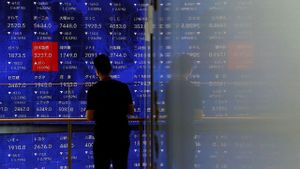US President Donald Trump’s recent imposition of new tariffs against China has extended its reach to products originating from Hong Kong, raising considerable concerns among businesses and policymakers alike. Effective immediately, the additional 10 percent levy on goods from China now includes items produced in Hong Kong, as outlined by the US Customs and Border Protection (CBP).
The CBP noted on Monday, "articles produced from China include products of Hong Kong," citing Executive Order 13936, which suspended Hong Kong's special trading status after the implementation of national security laws by Beijing last year. Although the United States had treated Hong Kong separately from mainland China since 1992, the recent shifts mark a significant change with potential economic repercussions.
China's immediate response to the new US tariffs was swift, imposing its own 15 percent tariffs on imports of coal and liquefied natural gas from the US, alongside 10 percent duties on various other US products. This tit-for-tat trade action has heightened tensions between two major world economies.
According to the Hong Kong Trade Development Council (HKTDC), the forecast for the city’s export growth has been trimmed by 0.5 percentage points to 3.5 percent for this year, largely due to the impact of these newly applied US tariffs. HKTDC director Irina Fan Yuen-yee noted the expected mild impact on Hong Kong's economy, largely because the US market accounts for a relatively minor share of the city’s overall exports.
Fan explained, "Hong Kong's exports to the United States account for only about 3 percent of the total. Comparatively, countries like Canada and Mexico have figures reaching as high as 70 to 80 percent. Therefore, the tariffs' influence on Hong Kong’s economy may seem limited, but they still present new challenges for businesses trying to adapt to these regulations." Between 2017 and 2023, exports to the US and European Union have declined by around 10 percent and 8 percent, respectively, contributing to Fan’s assessment.
The imposition of tariffs is expected to involve around HK$15 billion, and as product prices potentially rise, the market may have difficulty finding alternatives to Chinese goods, much to the concern of US consumers. Fan elaborated, "The strong quality and competitive pricing of Chinese products will make it hard for consumers to simply walk away, even as they face increasing prices due to the new tariffs." She emphasized the complex nature of tariff burdens, as they could be shared among exporters, importers, and consumers, depending on product demand and competitive conditions.
Meanwhile, the US Postal Service found itself entangled within the tariff fallout, briefly suspending inbound shipments from Hong Kong and China, before reversing its decision less than 24 hours later. This move initially threatened to disrupt trade significantly, but the agency assured consumers of their commitment to adhering to the new tariffs with minimal disruptions to package delivery systems.
Willy Lin Sun-mo, the chairman of the Hong Kong Shippers' Council, voiced concerns over the ramifications for e-commerce platforms. He remarked, "Many exported e-commerce products go through mainland or Hong Kong postal services. This suspension compromises our ability to fulfill orders, potentially leading to refund requests from customers. It’s imperative for businesses to pivot swiftly to more costly international courier options as the situation develops."
Despite the uncertainty posed by tariffs and their consequences, e-commerce and airline stocks of Chinese companies listed in Hong Kong responded negatively to the news of the tariffs. JD.com shares dropped by 3.5 percent, with other companies like Alibaba also witnessing slight declines.
Some experts contend Trump's measures targeting the "de minimis" exemption are likely to make products from popular retailers more expensive going forward. Still, they assert it would be unlikely to drastically alter shipment volumes overall.
This complex convergence of trade tensions between the US and China now includes Hong Kong, which remains caught in the middle of shifting political landscapes. For businesses bracing for changes, adjusting strategies to mitigate tariff impacts will be pivotal moving forward.



